Fleurs du Mal Magazine


Or see the index
Like Richard Ellmann’s James Joyce, Richard Zenith’s Pessoa immortalizes the life of one of the twentieth century’s greatest writers.
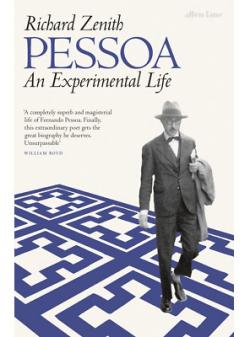 Nearly a century after his wrenching death, the Portuguese poet Fernando Pessoa (1888–1935) remains one of our most enigmatic writers. Believing he could do “more in dreams than Napoleon,” yet haunted by the specter of hereditary madness, Pessoa invented dozens of alter egos, or “heteronyms,” under whose names he wrote in Portuguese, English, and French.
Nearly a century after his wrenching death, the Portuguese poet Fernando Pessoa (1888–1935) remains one of our most enigmatic writers. Believing he could do “more in dreams than Napoleon,” yet haunted by the specter of hereditary madness, Pessoa invented dozens of alter egos, or “heteronyms,” under whose names he wrote in Portuguese, English, and French.
Unsurprisingly, this “most multifarious of writers” (Guardian) has long eluded a definitive biographer—but in renowned translator and Pessoa scholar Richard Zenith, he has met his match.
Relatively unknown in his lifetime, Pessoa was all but destined for literary oblivion when the arc of his afterlife bent, suddenly and improbably, toward greatness, with the discovery of some 25,000 unpublished papers left in a large, wooden trunk. Drawing on this vast archive of sources as well as on unpublished family letters, and skillfully setting the poet’s life against the nationalist currents of twentieth-century European history, Zenith at last reveals the true depths of Pessoa’s teeming imagination and literary genius.
Much as Nobel laureate José Saramago brought a single heteronym to life in The Year of the Death of Ricardo Reis, Zenith traces the backstories of virtually all of Pessoa’s imagined personalities, demonstrating how they were projections, spin-offs, or metamorphoses of Pessoa himself. A solitary man who had only one, ultimately platonic love affair, Pessoa used his and his heteronyms’ writings to explore questions of sexuality, to obsessively search after spiritual truth, and to try to chart a way forward for a benighted and politically agitated Portugal.
Although he preferred the world of his mind, Pessoa was nonetheless a man of the places he inhabited, including not only Lisbon but also turn-of-the-century Durban, South Africa, where he spent nine years as a child. Zenith re-creates the drama of Pessoa’s adolescence—when the first heteronyms emerged—and his bumbling attempts to survive as a translator and publisher.
Zenith introduces us, too, to Pessoa’s bohemian circle of friends, and to Ophelia Quieroz, with whom he exchanged numerous love letters.
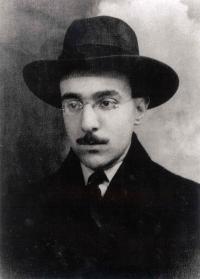 Pessoa reveals in equal force the poet’s unwavering commitment to defending homosexual writers whose books had been banned, as well as his courageous opposition to Salazar, the Portuguese dictator, toward the end of his life. In stunning, magisterial prose, Zenith contextualizes Pessoa’s posthumous literary achievements—especially his most renowned work, The Book of Disquiet.
Pessoa reveals in equal force the poet’s unwavering commitment to defending homosexual writers whose books had been banned, as well as his courageous opposition to Salazar, the Portuguese dictator, toward the end of his life. In stunning, magisterial prose, Zenith contextualizes Pessoa’s posthumous literary achievements—especially his most renowned work, The Book of Disquiet.
A modern literary masterpiece, Pessoa simultaneously immortalizes the life of a literary maestro and confirms the enduring power of Pessoa’s work to speak prophetically to the disconnectedness of our modern world.
Richard Zenith (1956, Washington, D.C.) is an American-Portuguese writer and translator, winner of Pessoa Prize in 2012.
Pessoa
A Biography
by Richard Zenith (Author)
Published by Liveright
July 20, 2021
Language : English
Hardcover : 1088 pages
ISBN-10 : 0871404710
ISBN-13 : 978-0871404718
$40.00
# new biography
Fernando Pessoa
Richard Zenith
• fleursdumal.nl magazine
More in: #Biography Archives, #Editors Choice Archiv, - Book News, - Bookstores, Archive O-P, Archive Y-Z, Art & Literature News, Pessoa, Fernando, TRANSLATION ARCHIVE
Het Portugese woord pessoa komt van het Latijnse persona, dat zowel ‘mens’ als ‘masker’ betekent.
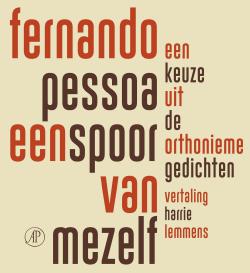 Precies daar moeten we Fernando Pessoa plaatsen, in de wereld van schijn, vermomming, spel, fictie. Hij vergelijkt zichzelf met een podium waarop allerlei acteurs rondlopen.
Precies daar moeten we Fernando Pessoa plaatsen, in de wereld van schijn, vermomming, spel, fictie. Hij vergelijkt zichzelf met een podium waarop allerlei acteurs rondlopen.
Zijn bekendste heteroniemen zijn Bernardo Soares (schrijver van het Boek der rusteloosheid) en de dichters Alberto Caeiro, Ricardo Reis en Álvaro de Campos. Pessoa heeft echter ook onder zijn eigen naam gedichten geschreven. Van dat orthonieme werk zag maar weinig het licht tijdens zijn leven.
Pas lang na zijn dood werden alle losse orthonieme gedichten bijeengebracht in drie delen van elk ruim vijfhonderd bladzijden.
Fernando Pessoa (1888-1935) was een groot Portugees dichter. Bij leven publiceerde deze kantoorklerk uit Lissabon slechts enkele werken. Na zijn dood werd op zijn huurkamer een kist aangetroffen met 27 duizend vol gekrabbelde velletjes. Uit die chaos kon een kolossaal oeuvre worden samengesteld. Niet dat van één dichter, maar van zo’n 25 ‘heteroniemen’ – afzonderlijke ‘schrijverspersoonlijkheden’ met elk een eigen stijl en woordkeus. Pessoa stierf op 47-jarige leeftijd, hij dronk zich dood.
De Arbeiderspers heeft de exclusieve vertaalrechten op zijn oeuvre. August Willemsen (1936-2007) vertaalde het leeuwendeel daarvan en schreef als introductie op de Pessoa-bibliotheek: Het ik als vreemde.
Auteur: Fernando Pessoa
Een spoor van mezelf.
Een keuze uit de orthonieme gedichten
Vertaler: Harrie Lemmens
Nederlands
Uitgeverij: De Arbeiderspers
NUR: 306
Poëzie
Paperback
296 pagina’s
ISBN: 9789029526456
Prijs: € 24,99
Publicatiedatum: 04-06-2019
• fleursdumal.nl magazine
More in: - Book News, Archive O-P, Archive O-P, Pessoa, Fernando, TRANSLATION ARCHIVE
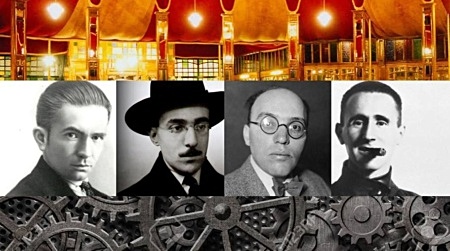
Magisch-industrieel variété met muziek, zang, magie en poëzie tijdens ‘O grote moderne geluiden’ bij het Pianolamuseum op zaterdagavond 15 april 2017
O grote moderne geluiden
Stichting Feest der Poëzie presenteert “O grote moderne geluiden” – magisch-industrieel variété met dada, futurisme, Berlijnse cabaretliederen, magie en poëzie. Verwonderaar Arjan van Vembde, klassiek liedduo Susanne Winkler en Daan van de Velde en voordrachtskunstenaar Simon Mulder brengen u in de frivole maar gevaarlijke sfeer van het begin van de vorige eeuw. Voor de pauze een Berlijns cabaret met magie en werk van o.a. Paul van Ostaijen, Bertolt Brecht en Kurt Weill, na de pauze een futuristische totaalvoordracht van Fernando Pessoa’s ‘Triomfode’ met muziek en zang. Vorig jaar een succes op Estival da Estrela in Portugal, dit jaar bij het Pianola Museum.
Brecht, Weill, Van Ostayen en Pessoa
Het programma bestaat uit liederen voor piano en sopraan van Kurt Weill op teksten van Bertolt Brecht, dadaïstische gedichten van Paul van Ostayen en als grote klapper de tot voordrachttheaterstuk met muziek en zang bewerkte Triomfode van Pessoa’s heteroniem Álvaro de Campos: een futuristische liefdesverklaring aan de zware industrie en de moderne consumptiemaatschappij.
Ewoud Kieft over oorlogsenthousiasme
Historicus Ewoud Kieft is schrijver van ‘Oorlogsenthousiasme’ over de aanloop naar de Eerste Wereldoorlog. Het boek is uitgekomen bij De Bezige Bij en werd genomineerd voor de Libris Geschiedenis Prijs. Hij komt het programma inleiden met een bespreking van de achtergrond van de gebrachte teksten in het kader van de aanloop naar en gevolgen van de Eerste Wereldoorlog.
Locatie: Pianola Museum, Westerstraat 106, Amsterdam
Datum: zaterdag 15 april
Zaal open: 20:00 uur
Aanvang: 20:30 uur
Entree: 15,- euro p.p. of 12,50 euro p.p. met korting (Stadspas, CJP, student, 65+)
Meer informatie: www.feestderpoezie.nl.
reservering via info@pianola.nl
fleursdumal.nl magazine
More in: Art & Literature News, Bertolt Brecht, DANCE & PERFORMANCE, Feest der Poëzie, Literary Events, MUSIC, Ostaijen, Paul van, Pessoa, Fernando, POETRY ARCHIVE, THEATRE
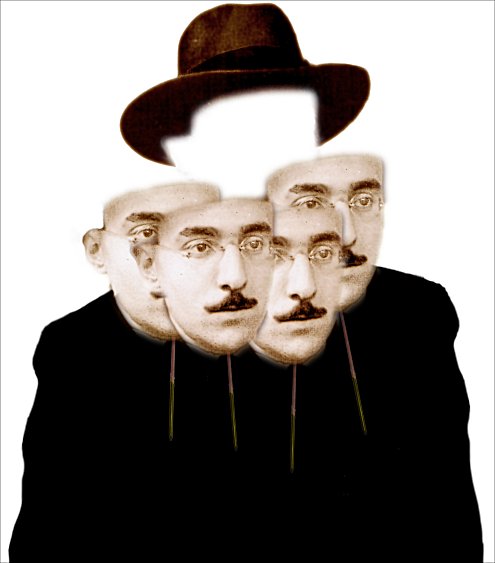
Pessoa – festival Utrecht
1 t/m 30 maart 2009
Festival rond Fernando Pessoa in Nederland
Van 1 t/m 30 maart 2009 vindt in Utrecht het festival “Pessoa in Nederland” plaats, gewijd aan de befaamde Portugese dichter Fernando Pessoa (1888-1935). Het is in 2009 dertig jaar geleden dat de eerste Nederlandse vertalingen van zijn werk verschenen. Het festival herdenkt de auteur met o.a. lezingen, poëzievoorstellingen, speelfilms, nieuwe Pessoa-uitgaven en de Nederlandse première van Pessoa’s nagelaten theaterfragmenten. Manuela Nogueira, Pessoa’s nicht die in haar jeugd bij de auteur in huis woonde, zal op 1 maart het festival openen.
.jpg)
Pessoa werd wereldberoemd door zijn raadselachtige gebruik van tientallen alter-ego’s (‘heteroniemen’) die hij naar eigen zeggen creëerde op ‘de triomfdag’ van zijn leven. Deze ‘triomfdag’ vond plaats op 8 maart 1914, tijdens het festival exact vijfennegentig jaar geleden. In Nederland werd Pessoa in de jaren zeventig ‘ontdekt’ door vertaler August Willemsen. Het festival is tevens een eerbetoon aan deze in 2007 overleden meestervertaler.
Sinds de eerste vertalingen die Willemsen publiceerde, geniet Pessoa een opvallend grote populariteit: zijn bundels werden enorme verkoopsuccessen en tientallen Nederlandse auteurs lieten zich inspireren door zijn werk. Onder meer Mark Boog, Arjen Duinker, Geert Buelens, Rob Schouten en Maarten Asscher zullen tijdens het festival spreken over deze invloed van Pessoa. “In elk van de gedichten van Pessoa zit een Hollands landschap”, schreef de Portugese dichter Nuno Júdice. Hij zal zijn motto voor het festival zelf voordragen tijdens de openingsmanifestatie op 1 maart in theater Kikker. Voorts zijn er elk weekeinde theaterprogramma’s in Salon Saffier, optredens van o.a. Denise Jannah en Maria de Fátima en nieuwe Pessoa-uitgaven bij uitgeverij De Arbeiderspers en uitgeverij IJzer. Er vinden in totaal zestien activiteiten plaats.
.jpg)
1 t/m 30 maart 2009 festival PESSOA IN NEDERLAND
Een festivalmaand in Utrecht met 16 voorstellingen rond de Portugese dichter Fernando Pessoa. Met op 1 maart een grote opening in theater Kikker en later in de maand lezingen, speelfilms, optredens van Nederlandse en Portugese dichters, nieuwe Pessoa-publicaties en de première van Pessoa’s toneelteksten.
Informatie op website: www.fernandopessoa.nl
FLEURSDUMAL.NL MAGAZINE
More in: Art & Literature News, Pessoa, Fernando
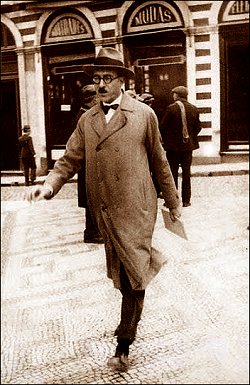
Fernando Pessoa
(1888-1935)
I am the escaped one
I am the escaped one,
After I was born
They locked me up inside me
But I left.
My soul seeks me,
Through hills and valley,
I hope my soul
Never finds me.

Poem of the week
August 17, 2008
kemp=mag poetry magzine
More in: Archive O-P, Pessoa, Fernando
.jpg)
Fernando Pessoa
(1888-1935)
English Poems
35 Sonnets (1918)
Sonnets 31-35
31
I am older than Nature and her Time
By all the timeless age of Consciousness,
And my adult oblivion of the clime
Where I was born makes me not countryless.
Ay, and dim through my daylight thoughts escape
Yearnings for that land where my childhood dreamed,
Which I cannot recall in colour or shape
But haunts my hours like something that hath gleamed
And yet is not as light remembered,
Nor to the left or to the right conceived;
And all round me tastes as if life were dead
And the world made but to be disbelieved.
Thus I my hope on unknown truth lay; yet
How but by hope do I the unknown truth get?
32
When I have sense of what to sense appears,
Sense is sense ere ’tis mine or mine in me is.
When I hear, Hearing, ere I do hear, hears.
When I see, before me abstract Seeing sees.
I am part Soul part I in all I touch–
Soul by that part I hold in common with all,
And I the spoiled part, that doth make sense such
As I can err by it and my sense mine call.
The rest is wondering what these thoughts may mean,
That come to explain and suddenly are gone,
Like messengers that mock the message’ mien,
Explaining all but the explanation;
As if we a ciphered letter’s cipher hit
And find it in an unknown language writ.
33
He that goes back does, since he goes, advance,
Though he doth not advance who goeth back,
And he that seeks, though he on nothing chance,
May still by words be said to find a lack.
This paradox of having, that is nought
In the world’s meaning of the things it screens,
Is yet true of the substance of pure thought
And there means something by the nought it means.
For thinking nought does on nought being confer,
As giving not is acting not to give,
And, to the same unbribed true thought, to err
Is to find truth, though by its negative.
So why call this world false, if false to be
Be to be aught, and being aught Being to be?
34
Happy the maimed, the halt, the mad, the blind–
All who, stamped separate by curtailing birth,
Owe no duty’s allegiance to mankind
Nor stand a valuing in their scheme of worth!
But I, whom Fate, not Nature, did curtail,
By no exterior voidness being exempt,
Must bear accusing glances where I fail,
Fixed in the general orbit of contempt.
Fate, less than Nature in being kind to lacking,
Giving the ill, shows not as outer cause,
Making our mock-free will the mirror’s backing
Which Fate’s own acts as if in itself shows;
And men, like children, seeing the image there,
Take place for cause and make our will Fate bear.
35
Good. I have done. My heart weighs. I am sad.
The outer day, void statue of lit blue,
Is altogether outward, other, glad
At mere being not-I (so my aches construe).
I, that have failed in everything, bewail
Nothing this hour but that I have bewailed,
For in the general fate what is’t to fail?
Why, fate being past for Fate, ’tis but to have failed.
Whatever hap-or stop, what matters it,
Sith to the mattering our will bringeth nought?
With the higher trifling let us world our wit,
Conscious that, if we do’t, that was the lot
The regular stars bound us to, when they stood
Godfathers to our birth and to our blood.
.jpg)
35 Sonnets (1918)
by Fernando Pessoa
Sonnets 31-35
More in: Pessoa, Fernando
.jpg)
Fernando Pessoa
(1888-1935)
English Poems
35 Sonnets (1918)
Sonnets 21-30
21
Thought was born blind, but Thought knows what is seeing.
Its careful touch, deciphering forms from shapes,
Still suggests form as aught whose proper being
Mere finding touch with erring darkness drapes.
Yet whence, except from guessed sight, does touch teach
That touch is but a close and empty sense?
How does mere touch, self-uncontented, reach
For some truer sense’s whole intelligence?
The thing once touched, if touch be now omitted,
Stands yet in memory real and outward known,
So the untouching memory of touch is fitted
With sense of a sense whereby far things are shown
So, by touch of untouching, wrongly aright,
Touch’ thought of seeing sees not things but Sight.
22
My soul is a stiff pageant, man by man,
Of some Egyptian art than Egypt older,
Found in some tomb whose rite no guess can scan,
Where all things else to coloured dust did moulder.
Whate’er its sense may mean, its age is twin
To that of priesthoods whose feet stood near God,
When knowledge was so great that ’twas a sin
And man’s mere soul too man for its abode.
But when I ask what means that pageant I
And would look at it suddenly, I lose
The sense I had of seeing it, nor can try
Again to look, nor hath my memory a use
That seems recalling, save that it recalls
An emptiness of having seen those walls.
23
Even as upon a low and cloud-domed day,
When clouds are one cloud till the horizon,
Our thinking senses deem the sun away
And say «’tis sunless» and «there is no sun»;
And yet the very day they wrong truth by
Is of the unseen sun’s effluent essence,
The very words do give themselves the lie,
The very thought of absence comes from presence:
Even so deem we through Good of what is evil.
He speaks of light that speaks of absent light,
And absent god, becoming present devil,
Is still the absent god by essence’ right.
The withdrawn cause by being withdrawn doth get
(Being thereby cause still) the denied effect.
24
Something in me was born before the stars
And saw the sun begin from far away.
Our yellow, local day on its wont jars,
For it hath communed with an absolute day.
Through my Thought’s night, as a worn robe’s heard trail
That I have never seen, I drag this past
That saw the Possible like a dawn grow pale
On the lost night before it, mute and vast.
It dates remoter than God’s birth can reach,
That had no birth but the world’s coming after.
So the world’s to me as, after whispered speech,
The cause-ignored sudden echoing of laughter.
That ‘t has a meaning my conjecture knows,
But that ‘t has meaning’s all its meaning shows.
25
We are in Fate and Fate’s and do but lack
Outness from soul to know ourselves its dwelling,
And do but compel Fate aside or back
By Fate’s own immanence in the compelling.
We are too far in us from outward truth
To know how much we are not what we are,
And live but in the heat of error’s youth,
Yet young enough its acting youth to ignore.
The doubleness of mind fails us, to glance
At our exterior presence amid things,
Sizing from otherness our countenance
And seeing our puppet will’s act-acting strings.
An unknown language speaks in us, which we
Are at the words of, fronted from reality.
26
The world is woven all of dream and error
And but one sureness in our truth may lie–
That when we hold to aught our thinking’s mirror
We know it not by knowing it thereby.
For but one side of things the mirror knows,
And knows it colded from its solidness.
A double lie its truth is; what it shows
By true show’s false and nowhere by true place.
Thought clouds our life’s day-sense with strangeness, yet
Never from strangeness more than that it’s strange
Doth buy our perplexed thinking, for we get
But the words’ sense from words–knowledge, truth, change.
We know the world is false, not what is true.
Yet we think on, knowing we ne’er shall know.
27
How yesterday is long ago! The past
Is a fixed infinite distance from to-day,
And bygone things, the first-lived as the last,
In irreparable sameness far away.
How the to-be is infinitely ever
Out of the place wherein it will be Now,
Like the seen wave yet far up in the river,
Which reaches not us, but the new-waved flow!
This thing Time is, whose being is having none,
The equable tyrant of our different fates,
Who could not be bought off by a shattered sun
Or tricked by new use of our careful dates.
This thing Time is, that to the grave-will bear
My heart, sure but of it and of my fear.
28
The edge of the green wave whitely doth hiss
Upon the wetted sand. I look, yet dream.
Surely reality cannot be this!
Somehow, somewhere this surely doth but seem!
The sky, the sea, this great extent disclosed
Of outward joy, this bulk of life we feel,
Is not something, but something interposed.
Only what in this is not this is real.
If this be to have sense, if to be awake
Be but to see this bright, great sleep of things,
For the rarer potion mine own dreams I’ll take
And for truth commune with imaginings,
Holding a dream too bitter, a too fair curse,
This common sleep of men, the universe.
29
My weary life, that lives unsatisfied
On the foiled off-brink of being e’er but this,
To whom the power to will hath been denied
And the will to renounce doth also miss;
My sated life, with having nothing sated,
In the motion of moving poisèd aye,
Within its dreams from its own dreams abated–
This life let the Gods change or take away.
For this endless succession of empty hours,
Like deserts after deserts, voidly one,
Doth undermine the very dreaming powers
And dull even thought’s active inaction,
Tainting with fore-unwilled will the dreamed act
Twice thus removed from the unobtained fact.
30
I do not know what truth the false untruth
Of this sad sense of the seen world may own,
Or if this flowered plant bears also a fruit
Unto the true reality unknown.
But as the rainbow, neither earth’s nor sky’s,
Stands in the dripping freshness of lulled rain,
A hope, not real yet not fancy’s, lies
Athwart the moment of our ceasing pain.
Somehow, since pain is felt yet felt as ill,
Hope hath a better warrant than being hoped;
Since pain is felt as aught we should not feel
Man hath a Nature’s reason for having groped,
Since Time was Time and age and grief his measures,
Towards a better shelter than Time’s pleasures.
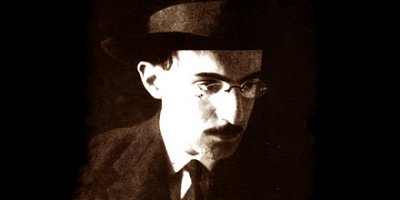
35 Sonnets (1918)
by Fernando Pessoa
Sonnets 21-30
More in: Pessoa, Fernando
.jpg)
F e r n a n d o P e s s o a
(1888-1935)
English Poems
35 Sonnets (1918)
Sonnets 11-20
11
Like to a ship that storms urge on its course,
By its own trials our soul is surer made.
The very things that make the voyage worse
Do make it better; its peril is its aid.
And, as the storm drives from the storm, our heart
Within the peril disimperilled grows;
A port is near the more from port we part–
The port whereto our driven direction goes.
If we reap knowledge to cross-profit, this
From storms we learn, when the storm’s height doth drive–
That the black presence of its violence is
The pushing promise of near far blue skies.
Learn we but how to have the pilot-skill,
And the storm’s very might shall mate our will.
12
As the lone, frighted user of a night-road
Suddenly turns round, nothing to detect,
Yet on his fear’s sense keepeth still the load
Of that brink-nothing he doth but suspect;
And the cold terror moves to him more near
Of something that from nothing casts a spell,
That, when he moves, to fright more is not there,
And’s only visible when invisible
So I upon the world turn round in thought,
And nothing viewing do no courage take,
But my more terror, from no seen cause got,
To that felt corporate emptiness forsake,
And draw my sense of mystery’s horror from
Seeing no mystery’s mystery alone.
13
When I should be asleep to mine own voice
In telling thee how much thy love’s my dream,
I find me listening to myself, the noise
Of my words othered in my hearing them.
Yet wonder not: this is the poet’s soul.
I could not tell thee well of how I love,
Loved I not less by knowing it, were all
My self my love and no thought love to prove.
What consciousness makes more by consciousness,
It makes less, for it makes it less itself,
My sense of love could not my love rich-dress
Did it not for it spend love’s own love-pelf.
Poet’s love’s this (as in these words I prove thee):
I love my love for thee more than I love thee.
14
We are born at sunset and we die ere morn,
And the whole darkness of the world we know,
How can we guess its truth, to darkness born,
The obscure consequence of absent glow?
Only the stars do teach us light. We grasp
Their scattered smallnesses with thoughts that stray,
And, though their eyes look through night’s complete mask,
Yet they speak not the features of the day.
Why should these small denials of the whole
More than the black whole the pleased eyes attract?
Why what it calls «worth» does the captive soul
Add to the small and from the large detract?
So, put of light’s love wishing it night’s stretch,
A nightly thought of day we darkly reach.
15
Like a bad suitor desperate and trembling
From the mixed sense of being not loved and loving,
Who with feared longing half would know, dissembling
With what he’d wish proved what he fears soon proving,
I look with inner eyes afraid to look,
Yet perplexed into looking, at the worth
This verse may have and wonder, of my book,
To what thoughts shall’t in alien hearts give birth.
But, as he who doth love, and, loving, hopes,
Yet, hoping, fears, fears to put proof to proof,
And in his mind for possible proofs gropes,
Delaying the true proof, lest the real thing scoff,
I daily live, i’th’ fame I dream to see,
But by my thought of others’ thought of me.
.jpg)
16
We never joy enjoy to that full point
Regret doth wish joy had enjoyèd been,
Nor have the strength regret to disappoint
Recalling not past joy’s thought, but its mien.
Yet joy was joy when it enjoyèd was
And after-enjoyed when as joy recalled,
It must have been joy ere its joy did pass
And, recalled, joy still, since its being-past galled.
Alas! All this is useless, for joy’s in
Enjoying, not in thinking of enjoying.
Its mere thought-mirroring gainst itself doth sin,
By mere reflecting solid life destroying,
Yet the more thought we take to thought to prove
It must not think, doth further from joy move.
17
My love, and not I, is the egoist.
My love for thee loves itself more than thee;
Ay, more than me, in whom it doth exist,
And makes me live that it may feed on me.
In the country of bridges the bridge is
More real than the shores it doth unsever;
So in our world, all of Relation, this
Is true–that truer is Love than either lover.
This thought therefore comes lightly to Doubt’s door–
If we, seeing substance of this world, are not
Mere Intervals, God’s Absence and no more,
Hollows in real Consciousness and Thought.
And if ’tis possible to Thought to bear this fruit,
Why should it not be possible to Truth?
18
Indefinite space, which, by co-substance night,
In one black mystery two void mysteries blends;
The stray stars, whose innumerable light
Repeats one mystery till conjecture ends;
The stream of time, known by birth-bursting bubbles;
The gulf of silence, empty even of nought;
Thought’s high-walled maze, which the outed owner troubles
Because the string’s lost and the plan forgot:
When I think on this and that here I stand,
The thinker of these thoughts, emptily wise,
Holding up to my thinking my thing-hand
And looking at it with thought-alien eyes,
The prayer of my wonder looketh past
The universal darkness lone and vast.
19
Beauty and love let no one separate,
Whom exact Nature did to each other fit,
Giving to Beauty love as finishing fate
And to Love beauty as true colour of it.
Let he but friend be who the soul finds fair,
But let none love outside the body’s thought,
So the seen couple’s togetherness shall bear
Truth to the beauty each in the other sought.
I could but love thee out of mockery
Of love and thee and mine own ugliness;
Therefore thy beauty I sing and wish not thee,
Thanking the Gods I long not out of place,
Lest, like a slave that for kings’ robes doth long,
Obtained, shall with mere wearing do them wrong.
20
When in the widening circle of rebirth
To a new flesh my travelled soul shall come,
And try again the unremembered earth
With the old sadness for the immortal home,
Shall I revisit these same differing fields
And cull the old new flowers with the same sense,
That some small breath of foiled remembrance yields,
Of more age than my days in this pretence?
Shall I again regret strange faces lost
Of which the present memory is forgot
And but in unseen bulks of vagueness tossed
Out of the closed sea and black night of Thought?
Were thy face one, what sweetness will’t not be,
Though by blind feeling, to remember thee!
.jpg)
English Poems
35 Sonnets (1918)
by Fernando Pessoa
Sonnets 11-20
More in: Pessoa, Fernando

F e r n a n d o P e s s o a
( 1 8 8 8 – 1 9 3 5 )
E n g l i s h P o e m s
3 5 S O N N E T S
Sonnets 1-10
1
Whether we write or speak or do but look
We are ever unapparent. What we are
Cannot be transfused into word or book.
Our soul from us is infinitely far.
However much we give our thoughts the will
To be our soul and gesture it abroad,
Our hearts are incommunicable still.
In what we show ourselves we are ignored.
The abyss from soul to soul cannot be bridged
By any skill of thought or trick of seeming.
Unto our very selves we are abridged
When we would utter to our thought our being.
We are our dreams of ourselves, souls by gleams,
And each to each other dreams of others’ dreams.
2
If that apparent part of life’s delight
Our tingled flesh-sense circumscribes were seen
By aught save reflex and co-carnal sight,
Joy, flesh and life might prove but a gross screen.
Haply Truth’s body is no eyable being,
Appearance even as appearance lies,
Haply our close, dark, vague, warm sense of seeing
Is the choked vision of blindfolded eyes.
Wherefrom what comes to thought’s sense of life? Nought.
All is either the irrational world we see
Or some aught-else whose being-unknown doth rot
Its use for our thought’s use. Whence taketh me
A qualm-like ache of life, a body-deep
Soul-hate of what we seek and what we weep.
3
When I do think my meanest line shall be
More in Time’s use than my creating whole,
That future eyes more clearly shall feel me
In this inked page than in my direct soul;
When I conjecture put to make me seeing
Good readers of me in some aftertime,
Thankful to some idea of my being
That doth not even my with gone true soul rime;
An anger at the essence of the world,
That makes this thus, or thinkable this wise,
Takes my soul by the throat and makes it hurled
In nightly horrors of despaired surmise,
And I become the mere sense of a rage
That lacks the very words whose waste might ‘suage.
4
I could not think of thee as piecèd rot,
Yet such thou wert, for thou hadst been long dead;
Yet thou liv’dst entire in my seeing thought
And what thou wert in me had never fled.
Nay, I had fixed the moments of thy beauty–
Thy ebbing smile, thy kiss’s readiness,
And memory had taught my heart the duty
To know thee ever at that deathlessness.
But when I came where thou wert laid, and saw
The natural flowers ignoring thee sans blame,
And the encroaching grass, with casual flaw,
Framing the stone to age where was thy name,
I knew not how to feel, nor what to be
Towards thy fate’s material secrecy.
5
How can I think, or edge my thoughts to action,
When the miserly press of each day’s need
Aches to a narrowness of spilled distraction
My soul appalled at the world’s work’s time-greed?
How can I pause my thoughts upon the task
My soul was born to think that it must do
When every moment has a thought to ask
To fit the immediate craving of its cue?
The coin I’d heap for marrying my Muse
And build our home i’th’ greater Time-to-be
Becomes dissolved by needs of each day’s use
And I feel beggared of infinity,
Like a true-Christian sinner, each day flesh-driven
By his own act to forfeit his wished heaven.
.jpg)
6
As a bad orator, badly o’er-book-skilled,
Doth overflow his purpose with made heat,
And, like a clock, winds with withoutness willed
What should have been an inner instinct’s feat;
Or as a prose-wit, harshly poet turned,
Lacking the subtler music in his measure,
With useless care labours but to be spurned,
Courting in alien speech the Muse’s pleasure;
I study how to love or how to hate,
Estranged by consciousness from sentiment,
With a thought feeling forced to be sedate
Even when the feeling’s nature is violent;
As who would learn to swim without the river,
When nearest to the trick, as far as ever.
7
Thy words are torture to me, that scarce grieve thee–
That entire death shall null my entire thought;
And I feel torture, not that I believe thee,
But that I cannot disbelieve thee not.
Shall that of me that now contains the stars
Be by the very contained stars survived?
Thus were Fate all unjust. Yet what truth bars
An all unjust Fate’s truth from being believed?
Conjecture cannot fit to the seen world
A garment of its thought untorn or covering,
Or with its stuffed garb forge an otherworld
Without itself its dead deceit discovering;
So, all being possible, an idle thought may
Less idle thoughts, self-known no truer, dismay.
8
How many masks wear we, and undermasks,
Upon our countenance of soul, and when,
If for self-sport the soul itself unmasks,
Knows it the last mask off and the face plain?
The true mask feels no inside to the mask
But looks out of the mask by co-masked eyes.
Whatever consciousness begins the task
The task’s accepted use to sleepness ties.
Like a child frighted by its mirrored faces,
Our souls, that children are, being thought-losing,
Foist otherness upon their seen grimaces
And get a whole world on their forgot causing;
And, when a thought would unmask our soul’s masking,
Itself goes not unmasked to the unmasking.
9
Oh to be idle loving idleness!
But I am idle all in hate of me;
Ever in action’s dream, in the false stress
Of purposed action never set to be.
Like a fierce beast self-penned in a bait-lair,
My will to act binds with excess my action,
Not-acting coils the thought with raged despair,
And acting rage doth paint despair distraction.
Like someone sinking in a treacherous sand,
Each gesture to deliver sinks the more;
The struggle avails not, and to raise no hand,
Though but more slowly useless, we’ve no power.
Hence live I the dead life each day doth bring,
Repurposed for next day’s repurposing.
10
As to a child, I talked my heart asleep
With empty promise of the coming day,
And it slept rather for my words made sleep
Than from a thought of what their sense did say.
For did it care for sense, would it not wake
And question closer to the morrow’s pleasure?
Would it not edge nearer my words, to take
The promise in the meting of its measure?
So, if it slept, ’twas that it cared but for
The present sleepy use of promised joy,
Thanking the fruit but for the forecome flower
Which the less active senses best enjoy.
Thus with deceit do I detain the heart
Of which deceit’s self knows itself a part.
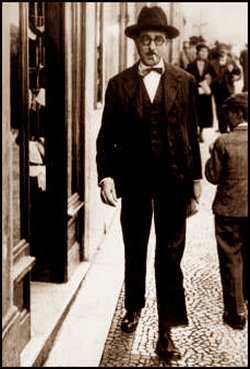
Fernando Pessoa:
35 Sonnets (1918)
Sonnets 1-10
More in: Pessoa, Fernando
Thank you for reading Fleurs du Mal - magazine for art & literature